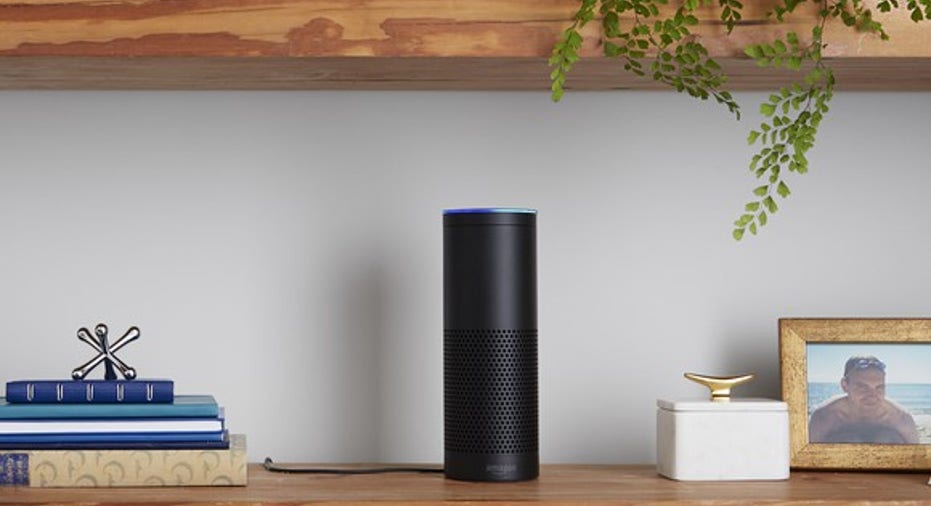Alexa Could Be Amazon's "Fourth Pillar"

Image source: Amazon.
In CEO Jeff Bezos' annual letter to Amazon (NASDAQ: AMZN) shareholders from April 2016, he highlighted the company's three pillars: Prime (its $99-a-year membership), Marketplace (where it sells items), and Amazon Web Services (its cloud computing business). All three have been instrumental to Amazon's success over the past decade-plus and Bezos wrote, "I assure you that we also remain hard at work on finding a fourth [pillar]."
It looks like that fourth pillar could be the Echo smart speaker featuring the Alexa digital assistant.
It's been two years since Amazon unveiled the Echo, which can serve as a hub for other smart-home devices like thermostats and lightbulbs, and its functionality has been extended through third-party "skills," which function like voice-controlled apps. Amazon has the scale and infrastructure necessary to grow the Echo and Alexa into its fourth pillar.
Voice computing is the future
Nobody expects using voice-activated digital assistants will replace using smartphones or desktop computers, not even Bezos. However, there's clearly a growing trend toward using voice search and interacting with digital assistants.
Google recently released a device similar to Echo, Google Home, in order to take advantage of the trend. Additionally, the Alphabet (NASDAQ: GOOG) (NASDAQ: GOOGL) subsidiary said voice searches tripled over the last two years.
As the artificial intelligence (AI) powering these devices improves, their usefulness increases. And as they're used more, the AI improves, creating a virtuous cycle.
Another virtuous cycle for Amazon
Amazon has a first-mover advantage in the smart speaker category, and its success with its Kindle line gives consumers confidence in its brand. But Amazon's biggest advantage with the Echo and Alexa is how it can integrate its existing Prime and Marketplace pillars into its Echo business.
One of the primary ways Google is considering monetizing voice searches is through commerce. It recently released a development kit for retailers and service providers to create apps for Google Assistant -- the AI powering Google Home and found in several other Google apps -- to connect with potential customers. Eventually, Google plans to take a cut of sales made through these apps.
But Amazon already has a direct line to customers and a huge marketplace of items -- one of its three pillars. Customers can order products using Alexa, and Amazon will use your order historyto figure out what you want or choose an item based on user reviews and pricing. Of course, that feature is only available to Prime members -- urging more customers to sign up for the service. Non-members can still ask Alexa to add items to their cart for checkout later, but they'd have to finish ordering the old-fashioned way and using your fingers to buy stuff online is so 2014.
As such, Alexa serves to support Amazon's Marketplace and Prime and vice versa. Similarly, Prime supports the Marketplace business by increasing customer loyalty and attracting new third-party sellers to the platform. That, in turn, brings more Prime-eligible products to the Marketplace, increasing the value of Prime.
Adding Alexa to the mix strengthens the other two pillars, making it another pillar.
Amazon is really pushing Alexa
Amazon is putting a lot of money behind marketing Alexa. It's been running a television and digital video ad campaign over the last year, including a Super Bowl commercial starring Alec Baldwin. Amazon produced over 100 10-second spots for the campaign based on real-life use cases of the voice assistant.
Most recently, Amazon struck a deal with Wynn Hotels to put an Echo device in each of Wynn's 4,748 Las Vegas hotel rooms. The device will be able to control the lights, temperature, drapes, and TV, with potentially more features to come. It's a clever marketing ploy that will introduce thousands of people to the Echo and allow them to have a firsthand experience using it.
Behind the scenes, Amazon has over 1,000 employees working on Alexa, according to Bezos. He also said the current functionality of Alexa is "just the tip of the iceberg."
It's clear from its investments that Amazon sees the huge potential of Alexa. It's not just a stand-alone product, but a potential pillar of its business that supports its other operations -- specifically, Marketplace and Prime.
10 stocks we like better than Amazon.com When investing geniuses David and Tom Gardner have a stock tip, it can pay to listen. After all, the newsletter they have run for over a decade, Motley Fool Stock Advisor, has tripled the market.*
David and Tom just revealed what they believe are the 10 best stocks for investors to buy right now... and Amazon.com wasn't one of them! That's right -- they think these 10 stocks are even better buys.
Click here to learn about these picks!
*Stock Advisor returns as of Nov. 7, 2016
Suzanne Frey, an executive at Alphabet, is a member of The Motley Fool's board of directors. Adam Levy owns shares of Amazon.com. The Motley Fool owns shares of and recommends Alphabet (A shares), Alphabet (C shares), and Amazon.com. The Motley Fool has a disclosure policy.



















